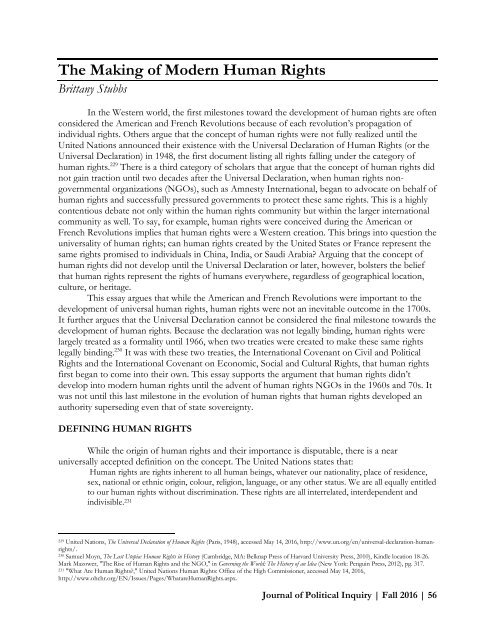Fall2016_Final
Create successful ePaper yourself
Turn your PDF publications into a flip-book with our unique Google optimized e-Paper software.
The Making of Modern Human Rights<br />
Brittany Stubbs<br />
In the Western world, the first milestones toward the development of human rights are often<br />
considered the American and French Revolutions because of each revolution’s propagation of<br />
individual rights. Others argue that the concept of human rights were not fully realized until the<br />
United Nations announced their existence with the Universal Declaration of Human Rights (or the<br />
Universal Declaration) in 1948, the first document listing all rights falling under the category of<br />
human rights. 229 There is a third category of scholars that argue that the concept of human rights did<br />
not gain traction until two decades after the Universal Declaration, when human rights nongovernmental<br />
organizations (NGOs), such as Amnesty International, began to advocate on behalf of<br />
human rights and successfully pressured governments to protect these same rights. This is a highly<br />
contentious debate not only within the human rights community but within the larger international<br />
community as well. To say, for example, human rights were conceived during the American or<br />
French Revolutions implies that human rights were a Western creation. This brings into question the<br />
universality of human rights; can human rights created by the United States or France represent the<br />
same rights promised to individuals in China, India, or Saudi Arabia? Arguing that the concept of<br />
human rights did not develop until the Universal Declaration or later, however, bolsters the belief<br />
that human rights represent the rights of humans everywhere, regardless of geographical location,<br />
culture, or heritage.<br />
This essay argues that while the American and French Revolutions were important to the<br />
development of universal human rights, human rights were not an inevitable outcome in the 1700s.<br />
It further argues that the Universal Declaration cannot be considered the final milestone towards the<br />
development of human rights. Because the declaration was not legally binding, human rights were<br />
largely treated as a formality until 1966, when two treaties were created to make these same rights<br />
legally binding. 230 It was with these two treaties, the International Covenant on Civil and Political<br />
Rights and the International Covenant on Economic, Social and Cultural Rights, that human rights<br />
first began to come into their own. This essay supports the argument that human rights didn’t<br />
develop into modern human rights until the advent of human rights NGOs in the 1960s and 70s. It<br />
was not until this last milestone in the evolution of human rights that human rights developed an<br />
authority superseding even that of state sovereignty.<br />
DEFINING HUMAN RIGHTS<br />
While the origin of human rights and their importance is disputable, there is a near<br />
universally accepted definition on the concept. The United Nations states that:<br />
Human rights are rights inherent to all human beings, whatever our nationality, place of residence,<br />
sex, national or ethnic origin, colour, religion, language, or any other status. We are all equally entitled<br />
to our human rights without discrimination. These rights are all interrelated, interdependent and<br />
indivisible. 231<br />
229<br />
United Nations, The Universal Declaration of Human Rights (Paris, 1948), accessed May 14, 2016, http://www.un.org/en/universal-declaration-humanrights/.<br />
230<br />
Samuel Moyn, The Last Utopia: Human Rights in History (Cambridge, MA: Belknap Press of Harvard University Press, 2010), Kindle location 18-26.<br />
Mark Mazower, "The Rise of Human Rights and the NGO," in Governing the World: The History of an Idea (New York: Penguin Press, 2012), pg. 317.<br />
231<br />
"What Are Human Rights?," United Nations Human Rights: Office of the High Commissioner, accessed May 14, 2016,<br />
http://www.ohchr.org/EN/Issues/Pages/WhatareHumanRights.aspx.<br />
Journal of Political Inquiry | Fall 2016 | 56
















